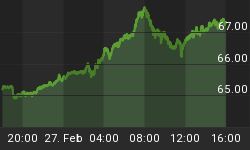In his testimony to the Joint Economic Committee today, Fed Chairman Bernanke sent a strong hint of an imminent FOMC pause in its funds rate increases. Mind you, a May 10 rate hike of 25 basis points is almost a done deal as implied by the following excerpt from Bernanke's prepared comments of today:
"In the statement issued after its March meeting, the FOMC noted that economic growth had rebounded strongly in the first quarter but appeared likely to moderate to a more sustainable pace. It further noted that a number of factors have contributed to the stability in core inflation. However, the Committee also viewed the possibility that core inflation might rise as a risk to the achievement of its mandated objectives, and it judged that some further policy firming may be needed to keep the risks to the attainment of both sustainable economic growth and price stability roughly in balance. In my view, data arriving since the meeting have not materially changed that assessment of the risks." [emphasis added]
The "pause" hint comes from the following excerpts:
"Focusing on the medium-term forecast horizon is necessary because of the lags with which monetary policy affects the economy." [emphasis added]
"In particular, even if in the Committee's judgment the risks to its objectives are not entirely balanced, at some point in the future the Committee may decide to take no action at one or more meetings in the interest of allowing more time to receive information relevant to the outlook. Of course, a decision to take no action at a particular meeting does not preclude actions at subsequent meetings, and the Committee will not hesitate to act when it determines that doing so is needed to foster the achievement of the Federal Reserve's mandated objectives." [emphasis added]
Firstly, from these excerpts we learn that the FOMC is trying to look ahead at likely economic performance rather than just behind at past performance, hence the reference to "the medium-term forecast horizon." Secondly, we learn that the FOMC implicitly appreciates the lagged effects of past interest rate increases when Bernanke states that the FOMC might decide to "take no action" in order to "receive information relevant to the outlook" even if the perceived "risks to its objectives are not entirely balanced." If the FOMC does pause, it does not want the financial markets to prejudge its next policy moves. In order to control these expectations, Bernanke threw in that "a decision to take no action at a particular meeting does not preclude actions at subsequent meetings.
Putting all of this together, along with the FOMC's heightened concern about the housing market, I think there is a better than 50% probability that the FOMC will signal a pause after increasing the funds rate by 25 basis points to 5% at its May 10 meeting.
The Housing Market Environment - Government Stats vs. Company Stats
It was reported yesterday by the Census Bureau that new single-family-home sales rose 13.8% in March. Hmm. All this talk about the housing sector weakening must be just that - talk. But wait a minute. Yesterday afternoon and this morning some large national homebuilding corporations announced their first quarter results. Both Centex and Pulte said their year-overyear new order fell 11%. Centex cut its forecast and Pulte's forecast is below that of the consensus. Beazer reported orders down 19% overall, with a decline of 46% in the West. Government statistics are more likely to be revised than are these results from homebuilders. Believe what you want, folks, but the shaky foundation of the housing industry is showing severe cracks. And, as goes housing, so goes the U.S. economy.















